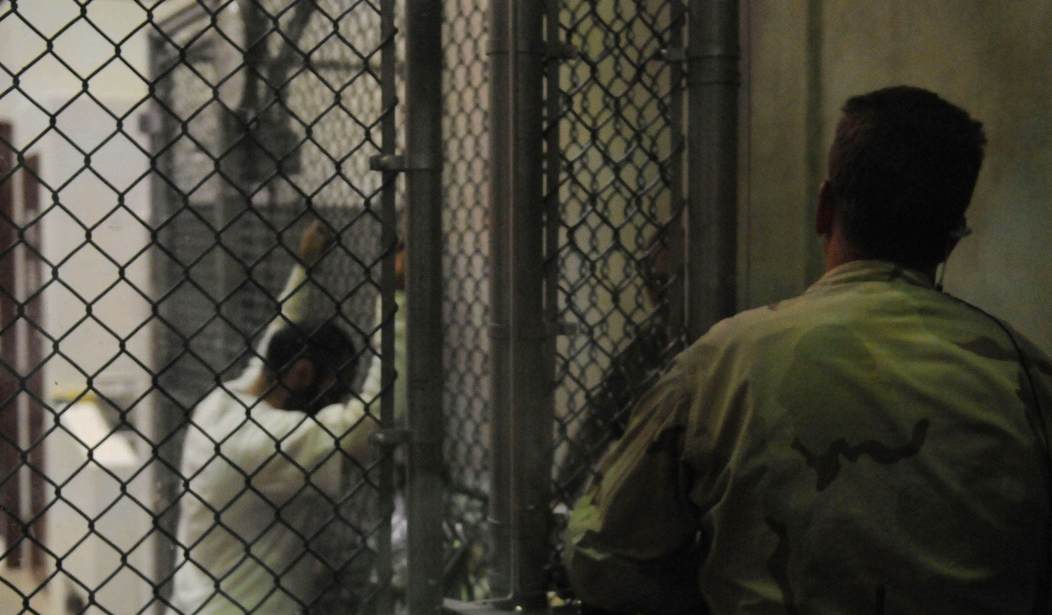WASHINGTON — There are fewer than five months remaining in President Obama’s term, and 61 detainees — and Congress — stand between the president and his goal of closing the prison facility at Guantanamo Bay.
Only 20 of the remaining prisoners have been cleared for transfer to a suitable country.
White House press secretary Josh Earnest said Wednesday that “we still have to go and do some diplomatic work with other countries to determine who’s willing to assume responsibility for these individuals and who’s also willing to assist with the implementation of whatever restrictions may be necessary against them after they’re transferred.”
Today, Earnest was asked how Obama could still be confident that Gitmo will be closed by the time he leaves office.
“What we will continue to do is to work to overcome the obstacles that Congress has erected to prevent the closure of the prison at Guantanamo Bay,” Earnest replied. “And that’s unfortunate, particularly when you consider that Democrats and Republicans, national security professionals in both parties, agree with the conclusion that President Obama has reached, which is that the American people are best served by closing the prison at Guantanamo Bay.”
“…So, you know, we’re going to do our best to try to get this closed. And it’s our expectation that that’s what we’ll do.”
However, Earnest added that he couldn’t “lay out for you exactly the path for how that’s going to take place right now.”
“But the president has made clear that this is a priority. And he did that in the earliest days of his presidency, and it remains a priority here at — in the last several months of his presidency.”
Vice President Joe Biden told reporters in Sweden today that it is his “hope and expectation” that Obama shuts Guantanamo.
House Foreign Affairs Committee Republicans quickly fired off a press release noting that “Obama wants to bring these terrorists to the U.S., but the American people and bipartisan majorities in Congress have rejected this plan again and again.”
“Given that half of the remaining detainees are too dangerous to release and that it would be illegal to transfer them to the U.S., how does Vice President Biden expect the president to close Gitmo without violating the law?”
Earnest argued that while there’s bipartisan opposition to closing Gitmo, “there’s strong bipartisan support among foreign policy experts for it.”
“So we’re going to have to work through that political opposition. And I can’t sketch forward the path for you. I don’t know exactly what that path looks like. But the president’s determined to make progress and accomplish this goal before he leaves,” he said, adding “your pessimism is understandable, but we’re in the business of hope around here.”
Pentagon press secretary Peter Cook told reporters at the Pentagon today that there were no imminent transfers to announce, but Defense Secretary Ashton Carter “continues to take the steps that he feels are necessary to take to responsibly close the detention facility of Guantanamo Bay.”
“And that includes continuing to try and work with Congress in terms of closing the facility, and also, as appropriate, continuing to review the cases of individuals who have been deemed eligible for transfer through the interagency process,” Cook said. “And if there are additional people who meet the interagency process and have been approved for transfer, then, of course, the secretary will give consideration to those individual cases on a case-by-case basis.”
The administration is blocked by law from transferring Gitmo detainees to U.S. soil.
Cook said Carter “remains confident that there’s an opportunity here to have a conversation with Congress — an appropriate conversation — about the future of the facility, and whether or not there could be an opportunity to move those who cannot be transferred to another location — to another country, those who cannot be released because they pose such a threat — to housing them in a facility — an appropriate facility here in the United States.”









Join the conversation as a VIP Member